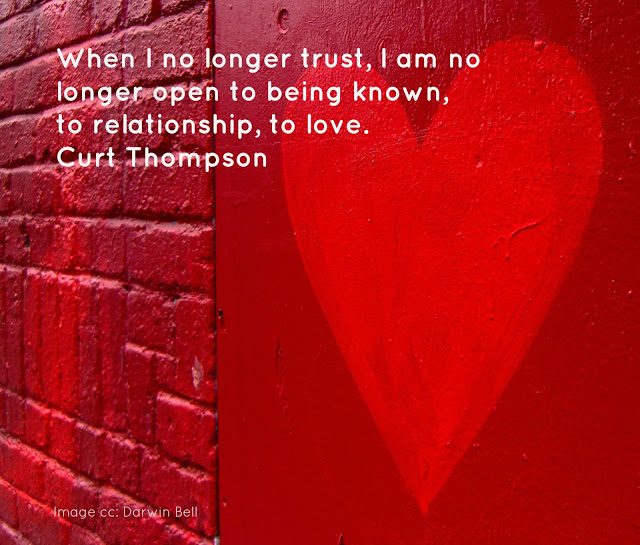To be known is to be pursued, examined, and shaken.
To be known is to be pursued, examined, and shaken.
To be known is to be loved and to have hopes and even demands placed on you.
It is to risk, not only the furniture in your home being rearranged, but your floor plans being rewritten, your walls being demolished and reconstructed.
To be known means that you allow your shame and guilt to be exposed—in order for them to be healed. Curt Thompson
Do you want to be known?
Do I want to be known?
Hmm, not really, not by anybody other than by someone who has experienced the kind of shame and humiliation that I fear.
I am recovering the claim that Jesus was not crucified
in a cathedral between two candles,
but on a cross between two thieves;
on the town garbage heap;
at a crossroad so cosmopolitan that they had to write His title
in Hebrew and in Latin and in Greek;
at the kind of place where cynics talk smut,
and thieves curse,
and soldiers gamble.
Because that is where He died.
And that is what He died about.
George MacLeod
The only problem is that I only know Jesus dimly, like looking through a mesh curtain.
I know something of him, I have some mind knowledge, some experiential knowledge, yet I still only know him partially. I have had a taste of knowing him, which excites my taste buds with an expectation of an eternal everlasting feast of knowing, and being known.
I have heard this so many times, said and unsaid.
People have a craving for the loneliness to be filled. Yet dig deep enough and you will find an obstruction or a wall to being known.
‘If you really knew me you wouldn’t love me’ or the wall of ‘I will never let my heart be broken again’. Perhaps there are many other walls that we raise up to being known.
Do you …
- Back off quick?
- Refer them to a ‘professional’?
- Give quick advice?
- Problem solve?
- Self reference with your own story or the experience of someone else?
- (insert your favourite avoidance tactic here)
Or do you
- Gently and respectfully ask questions that demonstrate your desire to know the person and not just the illness.
In a Lancet study it was discovered that people with mental illnesses adjust their expectations to society’s views.
The study discovered that more than a third of participants had not started a new relationship because they expected it to fail as a result of discrimination. For the same reason, 71 per cent said that they wished to conceal their diagnosis of depression from others. The cycle of social exclusion and self-exclusion is therefore complete.
Most research on discrimination shows that direct social contact between people in good health and people with a mental illness is an important way to reduce stigma.
Concealment therefore reduces social contact and perpetuates stigma. On the other hand, disclosure also brings real risks of discrimination. Those with mental illness are constantly confronted with this dilemma of keeping quiet or opening up. New Scientist
- It is only when we are known that we are positioned to become conduits of love. And it is love that transforms our minds, makes forgiveness possible, and weaves a community of disparate people into the tapestry of God’s family.
- When I know that I know something because I can logically prove it, I step away from trust. When I no longer trust, I am no longer open to being known, to relationship, to love.
- Ultimately, then, knowledge alone does not satisfy. What does satisfy is being known.
- We have failed to see that this need to be right, to be rationally orderly and correct, subtly but effectively prevents us from the experience of being known, of loving and being loved, which is the highest call of humanity.
- Is not hard to see why we are infatuated with knowing things in this way. It gives us the illusion that we are secure and in charge. We are no longer vulnerable. We believe we are safe, protected, and happy. We delude ourselves into thinking that we know God, but God as we believe him to be—in control and invulnerable—not God as Scripture describes him to be: risk-taking and able to be hurt badly. We no longer have to trust since we’ve got him all figured out. Knowing things and being right is very important to us, but when overemphasized it comes with a price.
Questions to consider and leave a comment.
- How have you seen the cycle of social exclusion and self-exclusion demonstrated in your life?
- What walls do you or others put up to being known?
- What avoidance techniques have you experienced by people afraid to truly know you?
Barry Pearman






3 thoughts on “You Want to be Known but …”
Hi Barry thanks for this. I’m writing from a place of being pretty well for the last decade or so, after being plagued with depression, a constant suicidal tape etc for a good decade before that. For me it was actually really helpful when others shared their stories and when they prayed for me. I know that when people pray there can be huge expectations of quick fixes, but I didn’t want to be unwell like that, and so to have people enter in and dare to hope with me was really powerful.
Thanks for this Kathy. So important to have people who pray and ‘dare to hope’ walking alongside us. In fact this is a point I am going to writing about in an upcoming blogpost, so well time!Grace and Peace!